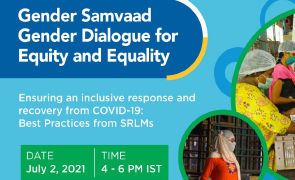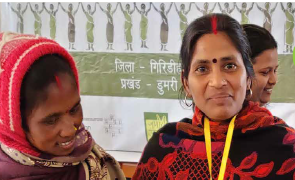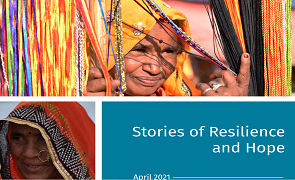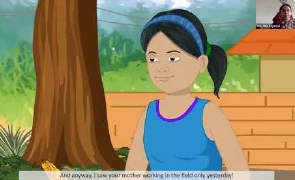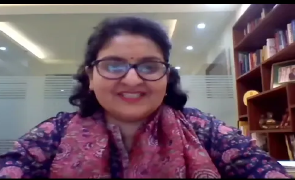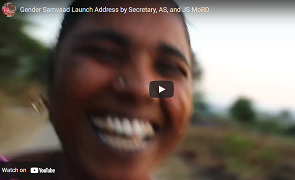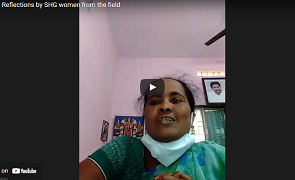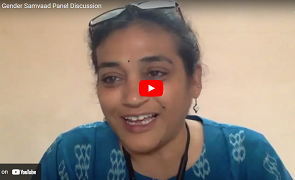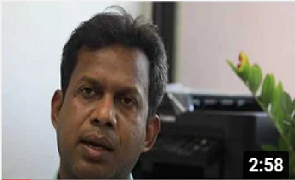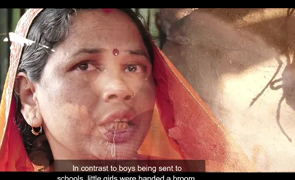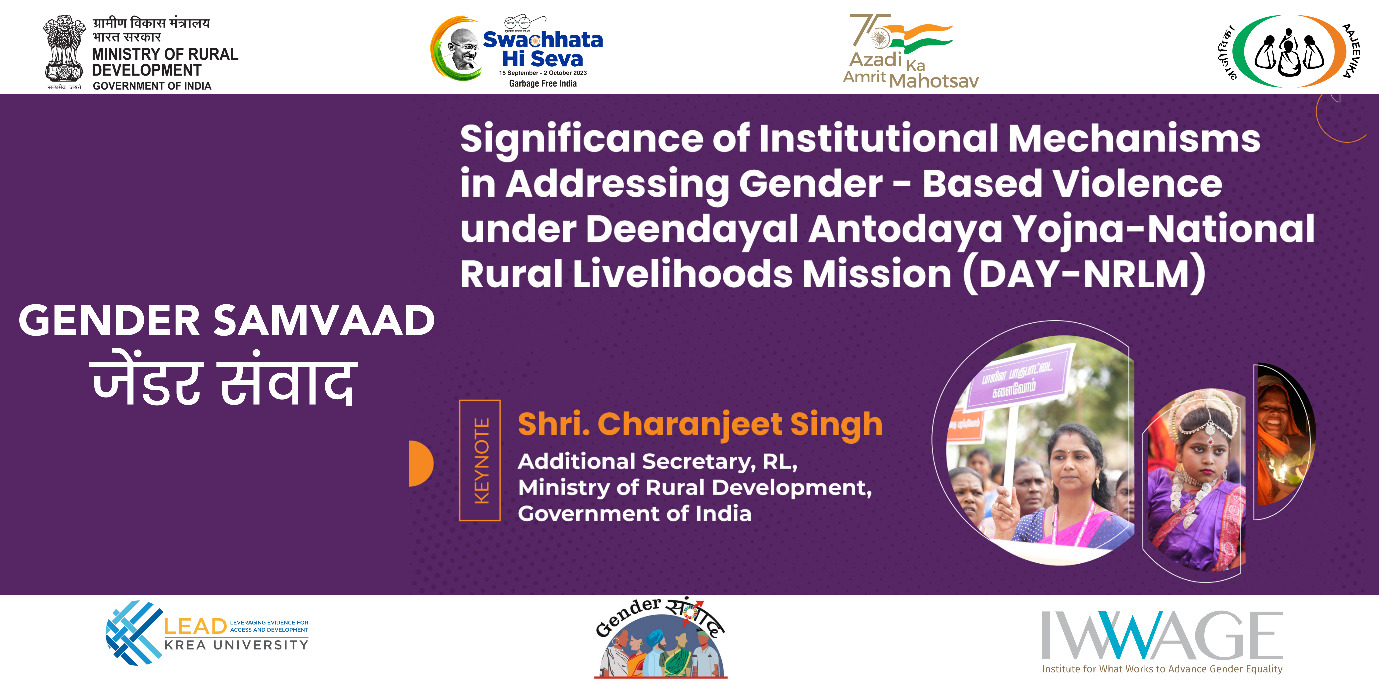

Each time a woman stands up for herself, without knowing it possibly, without claiming it, she stands up for all women
--Maya Angelou
About Gender Samvaad:
With over 60 million women mobilised to be part of one of India’s largest livelihoods programme, the Deendayal Antayodaya Yojana-National Rural Livelihoods Mission (DAY-NRLM) holds great promise for advancing women’s socio-economic empowerment by organising them into self-help groups (SHGs) and federations of the rural poor. Not only are these platforms facili tating financial opportunities and livelihood support services for women, but they have also become an extended arm of governance to demand accountability from and build linkages with mainstream institutions. They also hold stories of hundreds and thousands of women – stories of hope, resilience, raising voice, getting redress, and many best practices on how institutions of poor women can help them ensure access to their rights and entitlements.
Gender Samvaad is a joint attempt between DAY NRLM and IWWAGE to create a common platform for generating greater awareness on NRLM’s interventions across the country and best practices, with a focus on hearing voices from the states and the field. Organized as a bi-monthly webinar, the Samvaad will provide states with opportunities to:
- Understand best practices/initiatives that other states have been undertaking to improve women’s agency (e.g. facilitating women’s access to land rights, their engagement in farmer producer organizations (FPOs), best practices around FNHW, in establishing strong institutions for public service delivery, in protecting and providing redress to vulnerable groups within women (e.g. practices against witch hunting) etc.))
- Understand gender interventions globally;
- Engage with experts and other colleagues on suggestions regarding how to handle issues/implementation barriers;
- Contribute to creation of a ‘gender repository’ with resource materials on best practices for gender interventions across the country/other countries; and
- Build advocacy around the need to focus on gender issues across SRLMs and the NRLM.
In the current context of the pandemic, time is opportune to initiate such dialogues with a varied range of stakeholders to comprehend broader policies and more micro processes underlying such initiatives. In doing so, Gender Samvaad will cover stakeholders ranging from representatives of state rural livelihood missions (who would share their experiences) to NRLM’s senior officials, representatives from civil society, academia and multilateral institutions, and international experts implementing similar women’s empowerment programs around the world, who would offer their feedback and recommendations to the states.
Fourth Gender Samvaad was co-organized by Deendayal Antyodaya Yojana-National Rural Livelihoods Mission ((DAY-NRLM) and Institute for What Works to Advance Gender Equality (IWWAGE) –September 22, 2023
The fourth Gender Samvaad was co-organized by Deendayal Antyodaya Yojana-National Rural Livelihoods Mission (DAY-NRLM), Ministry of Rural Developmen and Institute for What Works to Advance Gender Equality (IWWAGE) on September 22nd 2023. The virtual event brought together over 8000 participants, including senior officials MoRD, Ministry of Women and Child Development, Government of Bihar and state government officials, practitioners, gender experts, academia, civil society actors, and members of self-help groups.
Gender Samvaad, is a unique, joint attempt between DAY-NRLM and IWWAGE to establish a shared platform to generate awareness on DAY-NRLM’s gender interventions across the country, with a focus on hearing voices from the states and of SHG members.
In his keynote address, Additional Secretary, Ministry of Rural Development, Shri Charanjit Singh expressed concerns over the statistics on gender based violence and emphasised on the role that community based institutions can play in addressing this issue. He also stressed on inter-ministerial convergence to address Gender Based Violence, especially with Ministry of Information and Broadcasting and Ministry of Education for awareness generation and sensitisation.
Joint Secretary, DAY-NRLM, Smt. Smriti Sharan highlighted the extensive efforts undertaken by DAY-NRLM in empowering women and creating model institutions to address women’s issues in rural areas particularly through the platform of Gender Resource Centre.
Community resource persons (CRP) from various states including Jharkhand, Kerala and Odisha were invited to share their experience of institutional strategies adopted to address gender based violence. Smt Rajani Dandasena from Odisha shared the experience of the functioning of the Prerna Kendra (Gender Resource centres) at Gram Panchayat level. The Prerna Kendras have established strong linkages with other departments through Gender Forum and have been able to address cases of Violence. The Gender Campaign launched in November 2022 has also led to widespread awareness on GBV and demanding public action through the institutions of the women. Women shared experiences of addressing issues like witch hunting, drug abuse, sexual violence, etc.
Smt. Mahua Roy Chaudhary from Jeevika, Government of Bihar highlighted the importance of gender training, learning pedagogies and use of IEC materials leading to creation of gender responsive institutions particularly Didi Adhikar kendras for addressing violence that is deep rooted in patriarchy and social norms. She also emphasized the political empowerment of women as ward members and mukhiyas in the state. She emphasized the importance of sustainability of these institutions in continuing delivering women’ s empowerment.
A panel discussion followed which included Joint Secretary from Ministry of Women and Child Development, Gender Expert and Women’s rights lawyer to emphasise the importance of SRLM and system related opportunities like legal remedies including fast track courts, horizontal and vertical gender training across different stakeholders and inter-ministerial convergence adopting multi-pronged strategies to address GBV. The panel discussed innovative financing for sustainability, safe spaces for women like Shakti Sadan and short stay homes, strengthening data driven governance and economic agency of women. The conversation laid out the scope of convergence between Naari Adalats under Mission Shakti with Gender Resource Centres under DAY-NRLM. The Samvaad 2023 ended with the need to come together to address the core issues of women through focus on preventive measures, convergence and innovative and local approaches of problem solving.
Launch of Gender Samvaad, April 16, 2021
As part of the ongoing Amrut Mahotsav to celebrate the 75th Anniversary of Indian Independence, Gender Samvaad was launched on April 16, 2021 with around 1400 participants including rural women, state representatives, CSOs and academia from across India. The event was attended by senior officials of the Ministry comprising Shri. Nagendra Nath Sinha, Secretary, Ministry of Rural Development; Smt. Alka Upadhyaya, Additional Secretary, Ministry of Rural Development; and Joint Secretary, NRLM, Smt. Nita Kejrewal. Community resource persons, who are women SHG members from various states, were also invited to share their experience of overcoming several barriers to improve their lives and livelihoods. The theme for the inaugural session was "Gender Transformative Rural Livelihoods".
During the launch event, a compendium of case studies “Stories of Resilience and Hope” documenting good practices and stories of resilience and transformative changes among SHG women shared by various State Rural Livelihoods Missions, was launched at the event by the Secretary, Rural Development. The stories narrate systemic processes adopted to strengthen women’s groups in developing strong collectives as well as individual identities. A short film was launched by the Joint Secretary, NRLM, Smt. Nita Kejrewal, showcasing IWWAGE’s support for operationalising NRLM’s gender strategy and the various pilot interventions underway to set up institutional platforms for rural women to access justice, information, rights and entitlements. Three States- Andhra pradesh, Jharkhand and Kerala presented during the inaugural session which narrated collective struggles of women's access to livelihoods opportunities by challenging the social norms and emerge as chamipons levraging the SHG platform. This was followed by a panel discussion that included leading gender and livelihoods experts to emphasise the importance of improving women’s livelihoods, their agency, and their understanding of their rights and entitlements. The panel comprised Dr. Lakshmi Lingam, Dean, School of Media and Cultural Studies, TISS; Ms. Sejal Dand, Director and Founder Member, ANANDI; and Dr. Renu Golwalkar, Global Director, Gender, Youth and Social Inclusion, Engender Health. The session was moderated by Soumya Kapoor Mehta, Head IWWAGE. Click here for the recording.
Gender Samvaad, second dialogue, July 2, 2021
The second Gender Samvaad was held on July 2, 2021 on the topic :Ensuring an inclusive response and recovery from COVID:Best practices from SRLMs. The event focused on the challenges posed by the second wave of the pandemic and the extent to which States have been able to respond to these by leveraging the collective potential and solidarity of women’s groups. The dialogue showcased best practices from the states in responding to the emerging needs ranging from access to health and other services, information related to COVID-19, access to food, and opportunities for work. The online event brought together the voices of state rural livelihood mission officials together with those of women affected by the pandemic. The focus states in the second dialogue were Bihar, Kerala and Meghalaya, talking about how they have been ensuring food security for communities and access to health information across all age groups. The second dialogue was attended by more than 2400 participants form across the states.
Smt. Aparajita Sarangi, Member of Parliament; Shri. Nagendra Nath Sinha, Secretary MoRD; Smt. Alka Upadhyaya, Additional Secretary; Smt. Nita Kejrewal, Joint Secretary from MoRD were present in the second edition of the Gender Samvaad. Senior officials from the States inlcuded Shri. Balamurugan D, CEO cum State Mission Director, Jeevika, Secretary RD, Govt. of Bihar; Shri. S. Harikishore, Executive Director, Kudumbashree, Govt. of Kerala; and Shri. P. Sampath Kumar, Principal Secretary, Govt. of Meghalaya, C&RD Dept. Health and Social Welfare Dept. Senior officers from the three States shared their insights and experiences on the response and recovery mechansim establihed by the States using the NRLM social capital. The event also brought voices from the field, and experience sharing from women Community Resource Persons who spoke about the problems faced by their families, coping mechanisms adapted, the role their groups have played during the pandemic, the duties performed at the village level and preparedness for future challenges. View the recoding here.
Gender Samvaad, third dialogue, March 11, 2022
Background: Gender Samvaad is a national virtual platform of DAY-NRLM used to generate greater awareness on DAY-NRLM’s interventions across the country. It is also an opportunity to share and learn best practices amongst the States Rural Livelihoods Missions and hear voices from SRLM cadres and SHG women. Two such events have been held earlier on 16 April 2021 and 2nd July 2021. The third Gender Samvaad event was organized to highlight issues around food & nutrition security and initiatives undertaken by the State Rural Livelihoods Missions and SHG members for the same. The United Nations standing committee on nutrition defines food and nutrition security as:
"Food and nutrition security exists when all people at all times have physical, social and economic access to food, which is consumed in sufficient quantity and quality to meet their dietary needs and food preferences, and is supported by an environment of adequate sanitation, health services and care, allowing for a healthy and active life." Food Security has 4 dimensions: Availability, Access, Utilization and Stability of food while Nutrition Security includes the additional dimensions of Care and feeding practices and Health and Sanitation.
Integrating FNHW within DAY-NRLM: In 2019, the DAY-NRLM adopted a ‘Dashasutra’ strategy for SRLMs, under which Food Security, Nutrition, Health and WASH (FNHW) and Gender are included as essential components needed to bring about social development. This inclusion of FNHW demonstrates the commitment of DAY-NRLM to contribute to overall improvement in health and nutrition of the community. Provision of food and nutrition security is an essential part of the FNHW strategy. To ensure the four dimensions of food security, i.e. Availability, Access, Utilization and Stability of food, DAY-NRLM envisages the following approaches, (1) establishment of nutrition garden and home consumption of produce of nutrition gardens by SHG families (2) increase in access of SHG households to Take Home Rations (THR) under ICDS (3) Promotion of nutrition-sensitive agriculture, (4) Improved coverage of SHG households under Public Distribution System (PDS) and (5) Addressing gender issues related to consumption of food. The effective operationalization of these approaches can be achieved through inter-departmental convergence between DAY-NRLM and M/oWCD, Ministry of Agriculture and Food and Public Distribution and intra-departmental convergence between FNHW and Farm Livelihoods verticals.
FNHW through a gender lens: In India, an effort for health and nutrition cannot reach fruition if certain critical issues are not addressed. Evidence demonstrates that, equitable distribution of food within the family is not achieved without addressing the GENDER NORMS. The common practice of women eating last, least and leftovers inhibits women from reaching their optimum nutritional potential, even if there is availability of adequate food in the home. Decisions on procurement of food products and their distribution within the family are also often taken by the head of the household who are mostly men, keeping members like women, young children and elderly at the fringes within the home. With this in mind, DAY-NRLM incorporates a gender lens while designing interventions around all aspects of social development. This gender intentional approach is being used in efforts for food and nutrition security as well.
Institutional partnerships to strengthen FNHW interventions for better gender outcomes
i) Promoting convergence between Farm Livelihood and FNHW of DAY-NRLM, MoRD for establishment and utilization of nutrition gardens by SHG families: The Ministry of Rural Development has been undertaking several steps to enhance promotion of nutrition gardens at household, community, Anganwadi and panchayat land across the country through DAY-NRLM and MGNREGA. A detailed Advisory was shared with SRLMs by the Farm Livelihoods (FL) vertical of DAY-NRLM to establish nutrition gardens, in May 2019. This was further supplemented by including work done for developing nutrition garden under the ambit of MGNREGA through a DO letter in August 2020. Additional thrust was given to this effort during the Poshan Maah, 2020, when the MoPR, MoRD and MoWCD issued a Joint Directive to all State Chief Secretaries to conduct a month-long drive to plant nutrition garden to enhance Food Security. As a result of these concerted efforts, 77.89 lakh Agri-Nutrition Gardens have been promoted across the SRLMs till December, 2021.
Evidence suggests that the mere presence of a nutrition garden at home does not translate into equitable gender norms for improved dietary diversity. There is a gap between having access to food and actually consuming it. Hence, along-side growing food, families also need to be counseled to include the produce of nutrition garden in their daily diet. Under FNHW component of DAY-NRLM, awareness sessions on diet diversity have been initiated through monthly discussion in SHG meetings and counseling the families through community-based events, home visits, village events etc. Some SRLMs have progressed in this regard, and Gender Samvaad could be an appropriate forum to share their experience with other SRLMs. Also the message of combining nutrition garden establishment with Social Behaviour Change Communication (SBCC) to emphasize the importance of planting nutrition gardens and supplementing it with counseling for behavior change so that each family consumes the produce of the garden, thereby improving diversity in their diet and moving a step further towards reaching a state of Nutritional security can be reiterated. Such dialogue will also enhance the opportunity of convergence within DAY-NRLM verticals and concerned departments.
ii) Promoting convergence between MoRD and MoWCD to improve access of SHG women to Take Home Rations (THR) and other services: The Ministry of Women and Child Development (MoWCD) launched the ICDS program on 2nd Oct 1975 and it remains one of the critical pillars for provision of food in the form of Take Home Rations (THR) and fresh cooked meals for pregnant and lactating women, children below 6 years of age and adolescent girls (under the SAG scheme). Under DAY-NRLM, SHG family with pregnant and lactating women, children below 6 years and adolescent girls are encouraged to avail the THR services from the local Anganwadi Center. A few SRLMs have collaborated with DoWCD for engaging SHGs producing and providing THR to Anganwadi Center.
iii) Promoting convergence between M/oRD and Ministry of Agriculture: Agricultural practices/cropping patterns also play a significant role in the access to foods for a community, which impacts their dietary pattern. Despite producing large quantities of nutrient-rich crops such as Rice, Pulses, Millets etc, India harbours one-third of the world’s stunted children. Evidence suggests that a move towards cultivation of nutrient-rich indigenous food crops such as Jowar, Bajra and other millets and diversification of crops can benefit the nutrition status of the local community. Women empowerment through Agricultural initiatives also has an important role to play in improving overall nutritional status.
iv) Convergence between MoRD and Department of Food and Civil Supplies for improved coverage of SHG households under Public Distribution System (PDS): Similarly, the Public Distribution System (PDS) plays a crucial role in reducing food insecurity by acting as a safety net by distributing essentials at a subsidized rate. With a network of more than 400,000 Fair Price Shops (FPS), the Public Distribution System (PDS) in India is perhaps the largest distribution machinery of its type in the world reaching 80 crore persons in the FY 2020-21. Under DAY-NRLM, linking of SHG members with entitlements and services are encouraged including access to subsidized food and other household materials under the PDS.
Objectives of 3rd Gender Samvaad:
- To inform participants about the benefits of nutrition-sensitive agriculture and nutrition garden in supplementing availability of diverse food groups at household level;
- To reinforce the significance of gender sensitive approaches while conveying nutrition messages to promote equity among men and women in consumption of food at home;
- Experience sharing between SRLMs on various learning and challenges faced during the implementation.
AGENDA
|
Time |
Session |
Speaker |
|
3:30 – 3:40 pm |
Welcome and Opening Remarks |
Smt. Nita Kejrewal Joint Secretary, MoRD |
|
3:40 - 3:45 pm |
Video on role of SHG members in addressing malnutrition |
Smt. Nita Kejrewal Joint Secretary, MoRD |
|
3:45 – 4:00 pm |
Initiatives under DAY-NRLM and need for convergence by MoRD |
Sh. Nagendra Nath Sinha Secretary, MoRD |
|
4:00 - 4:05 pm |
Video on POSHAN Maah-2021 activities under DAY-NRLM |
Smt. Nita Kejrewal Joint Secretary, MoRD |
|
4:05 – 4:25 pm |
Keynote Address |
Dr. Vinod Kumar Paul Member, NITI Aayog |
|
4:25 - 4:40 pm |
Addressing nutritional requirements of Women & Children through ICDS/POSHAN Abhiyaan & role of Self-Help Groups by MoWCD |
Shri Dhrijesh Tiwari Statistical Adviser, MoWCD |
|
4:40 - 4:55 pm |
Women’s rights & entitlements for food & nutrition security & role of government institutions by National Commission for Women |
Ms. Meeta Rajivlochan Member Secretary, NCW |
|
4:55 - 5:10 pm |
Presentation on behavioural change communication around FNHW activities and nutrition-sensitive agricultural practices undertaken in the State by SRLM, Bihar |
Shri Balamurugan D, Secretary, Rural Development Deptt., Government of Bihar cum CEO, BRLPS, SRLM CRP – 5 mins CEO – 10 mins |
|
5:10 - 5.25 pm |
Presentation on Nutrition Enterprises and other aspects of Nutritional Security by SRLM, Maharashtra |
Dr. Hemant Wasekar, CEO, SRLM, Maharashtra CRP – 5 mins CEO – 10 mins |
|
5:25 - 5:40 pm |
Evidence for role of Women’s Collectives in facilitating Household Food Security by IFPRI |
Ms. Kalyani Raghunathan, IFPRI |
|
5:40 - 5:55 pm |
Presentation on successes, challenges and way forward for Maitri Baithak and Pariwar Chawpal by SRLM, Chhattisgarh |
Smt. Effat Ara, Incharge-Mission Director, SRLM Chhattisgarh CRP – 5 mins CEO – 10 mins |
|
5:55 - 6:10 pm |
Question & Answer |
Moderator |
|
6:10 - 6:15 pm |
Closing remarks and vote of thanks by MoRD |
Sh. H.R Meena Deputy Secretary, M/oRD |
प्रत्येक बार महिला स्वयं के लिए उठ खड़ी होती है, संभवत: अनजाने में, बिना कोई दावा किए, वह सभी महिलाओं के लिए संघर्ष का प्रतीक बन जाती है।
--माया एजेलो
जेंडर संवाद के विषय में :
60 मिलियन से अधिक महिलाएं जो भारत के सबसे बड़े आजीविका कार्यक्रम में से एक दीनदयाल अंत्योदय योजना-राष्ट्रीय ग्रामीण आजीविका मिशन (डीएवाई-एनआरएलएम) का हिस्सा बनने के लिए प्रेरित हुईं, वे महिलाओं को स्वयं सहायता समूहों (एसएचजी) तथा ग्रामीण निर्धन संघ में संगठित करके उनका सामाजिक-आर्थिक सशक्तिकरण करने के लिए प्रतिबद्ध हैं। ये प्लेटफॉर्म न केवल महिलाओं के लिए वित्तीय अवसरों और आजीविका सहायता सेवाओं की सुविधा प्रदान कर रहे हैं, बल्कि वे मुख्यधारा के संस्थानों के साथ संबंध बनाने और उनसे जवाबदेही की मांग करने के लिए शासन का एक विस्तारित हाथ भी बन गए हैं। ये प्लेटफॉर्म उम्मीद, सहनशीलता, आवाज उठाने, शिकायतों के निवारण प्राप्त करने तथा गरीब महिलाओं के अधिकारों और हकदारियों की सुनिश्चित प्राप्ति में संस्थान किस प्रकार सहायता कर सकते हैं, आदि से संबंधित सैकड़ों और हजारों महिलाओं की कहानियों से लबरेज हैं।
जेंडर संवाद, डीएवाई एनआरएलएम और आईडब्ल्यूडब्ल्यूएजीई का एक संयुक्त प्रयास है, जो देश भर में एनआरएलएम के हस्तक्षेपों और उत्तम प्रथाओं पर अधिक से अधिक जागरूकता सृजन के लिए एक साझा प्लेटफॉर्म तैयार करता है, जिसमें राज्यों और इस क्षेत्र से उठने वाली आवाज़ों पर ध्यान केंद्रित किया जाता है। द्वि-मासिक वेबिनार के रूप में आयोजित वेबिनार 'संवाद' राज्यों को निम्नलिखित अवसर प्रदान करेगा:
- उन सर्वोत्तम प्रथाओं/पहलों को समझना जो महिलाओं की एजेंसी को बेहतर बनाने के लिए अन्य राज्यों ने किए हैं (जैसे भूमि अधिकारों के लिए महिलाओं की पहुंच को सुविधाजनक बनाना, किसान उत्पादक संगठनों (एफपीओ) में उनकी भागीदारी, सार्वजनिक सेवा वितरण के लिए मजबूत संस्थानों की स्थापना में एफएनएचडब्ल्यू की सर्वोत्तम प्रथाएं, महिलाओं में संवेदनशील समूहों के संरक्षण और शिकायत निवारण की व्यवस्था (जैसे डायन घोषित करके प्रताड़ित करना आदि)।
- विश्व स्तर पर लैंगिक हस्तक्षेप को समझना;
- मुद्दों/कार्यान्वयन बाधाओं को प्रबंधित करने के विषय में विशेषज्ञों तथा अन्य सहयोगियों के सुझाव लेना;
- देश/विदेश में लैंगिक हस्तक्षेप की सर्वोत्तम प्रथाओं पर संसाधन सामग्री के साथ 'जेंडर भंडार' (जेंडर रिपॉजिटरी) के सृजन का समर्थन; तथा
- एसआरएलएम और एनआरएलएम में लैंगिक मुद्दों पर ध्यान केंद्रित करने की आवश्यकता के के विषय में जागरूक करना।
महामारी के वर्तमान संदर्भ में, व्यापक नीतियों और इस तरह की पहल के तहत अधिक सूक्ष्म प्रक्रियाओं को समझने के लिए विविध हितधारकों के साथ ऐसे संवादों को शुरू करने का यह उपयुक्त समय है। ऐसा करने से, जेंडर संवाद राज्य ग्रामीण आजीविका मिशन (जो अपने अनुभव साझा करेंगे) के प्रतिनिधियों से लेकर एनआरएलएम के वरिष्ठ अधिकारियों, नागरिक समाज के प्रतिनिधियों, शैक्षणिक और बहुपक्षीय संस्थानों के प्रतिनिधियों और दुनिया भर में महिला सशक्तिकरण कार्यक्रमों को लागू करने वाले अंतर्राष्ट्रीय विशेषज्ञों को कवर करेगा, जो राज्यों को अपनी प्रतिक्रिया और संस्तुतियां प्रदान करेंगे।
जेंडर संवाद का शुभारम्भ, 16 अप्रैल, 2021
भारतीय स्वतंत्रता की 75 वीं वर्षगांठ मनाने के लिए चल रहे अमृत महोत्सव के अंग के रूप में, जेंडर संवाद 16 अप्रैल, 2021 को शुरू किया गया था, जिसमें सम्पूर्ण भारत से ग्रामीण महिलाओं, राज्य के प्रतिनिधियों, सीएसओ और शिक्षाविदों सहित लगभग 1400 प्रतिभागियों ने हिस्सा लिया था। इस कार्यक्रम में मंत्रालय के वरिष्ठ अधिकारियों ने भाग लिया जिसमें ग्रामीण विकास मंत्रालय के सचिव श्री नगेंद्र नाथ सिन्हा, ग्रामीण विकास मंत्रालय की अतिरिक्त सचिव श्रीमती अलका उपाध्याय और एनआरएलएम की संयुक्त सचिव श्रीमती नीता केजरीवाल शामिल थे। कम्युनिटी रिसोर्स पर्सन , जो विभिन्न राज्यों की महिला एसएचजी की सदस्य हैं, को भी की अपने जीवन और आजीविका में सुधर में आई अनेक बाधाओं को पर करने के अपने अनुभवों को हमसे साझा के लिए आमंत्रित किया गया था। उद्घाटन सत्र का विषय "जेंडर परिवर्तनकारी ग्रामीण आजीविका" था।
उद्घाटन समारोह के दौरान, विभिन्न राज्य ग्रामीण आजीविका मिशनों द्वारा साझा किए गए एसएचजी महिलाओं के बीच अच्छी प्रथाओं और सहिष्णु और रूपान्तरकारी परिवर्तनों की कहानियों का दस्तावेजीकरण करके घटनाओ का अध्ययन के एक संग्रह "सहिष्णुता और आशा की कहानियाँ" को ग्रामीण विकास सचिव द्वारा इस कार्यक्रम में लॉन्च किया गया था। इसकी कहानियां मजबूत सामूहिकता के साथ-साथ व्यक्तिगत पहचान विकसित करने में महिला समूहों को सशक्त करने के लिए अपनाई गई प्रणालीगत प्रक्रियाओं का वर्णन करती हैं। संयुक्त सचिव, एनआरएलएम, श्रीमती नीता केजरीवाल द्वारा एक लघु फिल्म का प्रमोचन किया गया जिसमें न्याय, सूचना, अधिकारों तथा हकदारियों तक पहुंच के लिए एनआरएलएम की लैंगिक कार्यनीति के संचालन तथा संस्थागत मंच स्थापित करने हेतु IWWAGE के सहयोग का प्रदर्शन किया गया है। तीन राज्यों-आंध्र प्रदेश, झारखंड और केरल ने उद्घाटन सत्र के दौरान एक प्रस्तुति दी . इस में सामाजिक मानदंडों को चुनौती देकर आजीविका के अवसरों तक पहुंचने के लिए महिलाओं के सामूहिक संघर्ष और एसएचजी मंच का लाभ उठाकर चैंपियन के रूप में उभरने की कहानी प्रदर्शित की गयी। इसके बाद एक पैनल चर्चा हुई जिसमें महिलाओं की आजीविका, उनकी एजेंसी, और उनके अधिकारों और पात्रता के संबंध में उनकी समझ में सुधार के महत्व पर जोर देने के लिए प्रमुख लैंगिक और आजीविका विशेषज्ञ शामिल थे। पैनल में डॉ. लक्ष्मी लिंगम, डीन, स्कूल ऑफ मीडिया एंड कल्चरल स्टडीज, टीआईएसएस; सुश्री सेजल डांड, निदेशक और संस्थापक सदस्य, आनंदी; और डॉ. रेणु गोलवलकर, ग्लोबल डायरेक्टर, जेंडर, यूथ एंड सोशल इनक्लूजन, एंजेंडर हेल्थ शामिल थे। सत्र का संचालन IWWAGE प्रमुख सौम्या कपूर मेहता ने किया। रिकॉर्डिंग के लिए यहां क्लिक करें।
जेंडर संवाद, दूसरी वार्ता, 2 जुलाई, 2021
दूसरा लिंग संवाद 2 जुलाई, 2021 को " कोविड से उभरने और एक समावेशी प्रतिक्रिया सुनिश्चित करने के लिए : एसआरएलएम की सर्वोत्तम प्रथाएँ " विषय पर आयोजित किया गया था। यह आयोजन महामारी की दूसरी लहर से उत्पन्न चुनौतियों और महिला समूहों की सामूहिक क्षमता और एकजुटता का लाभ उठाकर राज्य किस हद तक इनका जवाब देने में सक्षम हुए हैं, पर केंद्रित था। संवाद में, स्वास्थ्य और अन्य सेवाओं तक पहुंच, कोविड-19 से संबंधित जानकारी, भोजन की उप्लब्धता और काम के अवसरों सहित उभरती आवश्यकताओं की पूर्ति में राज्यों की सर्वोत्तम प्रथाओं को प्रदर्शित किया गया । इस ऑनलाइन कार्यक्रम में महामारी से प्रभावित महिलाओं के साथ-साथ राज्य ग्रामीण आजीविका मिशन के अधिकारियों की आवाज को एक मंच पर लाया। दूसरे संवाद में मुख्य राज्य बिहार, केरल और मेघालय थे, जिन्होंने बताया कि कैसे वे समुदायों के लिए खाद्य सुरक्षा सुनिश्चित कर रहे हैं और सभी आयु समूहों कोस्वास्थ्य संबंधी जानकारी तक पहुंचा रहे हैं। दूसरे संवाद में विभिन्न राज्यों के 2400 से अधिक प्रतिभागियों ने भाग लिया।
संसद सदस्य श्रीमती अपराजिता सारंगी; ग्रामीण विकास मन्त्रालय के सचिव श्री नागेंद्र नाथ सिन्हा; ग्रामीण विकास मन्त्रालय की अतिरिक्त सचिव श्रीमती अलका उपाध्याय, संयुक्त सचिव श्रीमती नीता केजरीवाल जेंडर संवाद के दूसरे संस्करण में उपस्थित थे। राज्यों के वरिष्ठ अधिकारियों में सीईओ सह राज्य मिशन निदेशक, जीविका, ग्रामीण विकास सचिव, बिहार सरकार श्री बालमुरुगन डी, केरल सरकार के कार्यकारी निदेशक, कुदुम्ब श्री. एस. हरिकिशोर; और मेघालय सरकार के प्रमुख सचिव श्री. पी संपत कुमार, सीएंडआरडी विभाग स्वास्थ्य और समाज कल्याण विभाग, तीन राज्यों के वरिष्ठ अधिकारियों ने एनआरएलएम सामाजिक पूंजी का उपयोग करके राज्यों द्वारा स्थापित प्रतिक्रिया और वसूली तंत्र पर अपनी सूझबूझ और अनुभव साझा किए। इस आयोजन में क्षेत्रीय लोगों को भी अवसर दिया गया, तथा महिला सामुदायिक संसाधन व्यक्तियों से अनुभव साझा किया, जिन्होंने अपने परिवारों के सामने आने वाली समस्याओं, अपनाये गये अनुकूलित तंत्रों, महामारी के दौरान उनके समूहों की भूमिका, ग्राम स्तर पर किए गए कर्तव्यों और भविष्य की चुनौतियों के लिए तैयारियों के बारे में बात की। रिकॉर्डिंग के लिए यहां क्लिक करें।
| Best Practices/Resources |
| बेहतरीन कार्यप्रणाली |
| Multimedia |
| बहुमाध्यम |
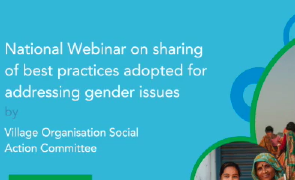
National Webinar on sharing of best practices adopted for addressing gender issues by VO SACs
VIEW MORE
| Upcoming Events |
| शीघ्र होने वाला कार्यक्रम |


